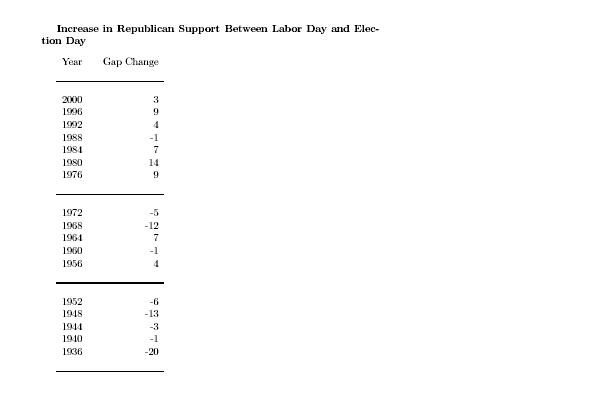« The NYT and Boston Globe Fail in Attempts to Smear Bush | Main | Taranto on Bush-Kerry as Deciding Who to Hire »
September 08, 2004
Polling Trends and Media Bias, 1936 to 2000
Yesterday I compared Kerry to Dukakis in poll patterns and flaws. Today, from the Gallup poll I constructed the following table showing how much the Republican Presidential candidate gained on the Democrat between Labor Day and Election Day. A positive number means the Republican improved by Election Day; a negative number means he worsened.

Notice the three time periods I've separated with horizontal lines. From 1936 to 1952, Republicans always slipped in the last two months of the campaign. From 1976 to 2000, Republicans gained in the last two months, with the single exception of 1988 when they slipped 1 point.
It is clear the media has been heavily Democratic in the 1976 to 2000 period. I've heard that it was heavily Republican in the 1936 to 1952 period-- that the newspaper editors hated the New Deal. Thus, this seems to support the idea that media bias is more important for early polls than for the actual election results, since late in the election its effect is moderated by the advertisements and other efforts of the campaigns.
That idea has big policy implications. If media bias is swinging 5 points in each election, shouldn't we try to increase candidate spending to moderate media power? Especially in this TV age, do we really want most political advertising to be done, in effect, by the few large corporations which dominate TV? The implication, it seems to me, is that we should not only free campaign spending from restrictions, but maybe even subsidize it so it will balance the spending of the media corporations.
Or, we could try to retain the spirit of McCain-Feingold: to reduce the amount of resources spent campaigning. Since the vast majority of those resources take the form of free campaigning by the liberal media though, the McCain-Feingold spirit takes us in a new direction: ban reporting on political news. The McCain-Feingold idea is that voters are too swayed by advertising. Once we take into account that "reporting" is really a form of free advertising, biased as it is, then since far more broadcast time is spent on the news than on campaign ads, the obvious and fair solution is to ban both ads and news. In fact, banning news is much more fair and important. Ad spending is pretty much equal between Republicans and Democrats, but the news is heavily, heavily skewed towards Democrats-- basically, Fox News is *maybe* Republican-- my impression is it is fairly neutral-- but all the rest is partisan Democrat. Thus, I think we conclude that in the next round of silly campaign finance legislation, we should completely deregulate paid advertising, but totally ban TV news.
Surely nobody would claim that making people rely on newspaper news would reduce the quality of our national political life, would they?
Posted by erasmuse at September 8, 2004 10:21 PM
Trackback Pings
TrackBack URL for this entry:
http://www.rasmusen.org/mt-new/mt-tb.cgi/168
Comments
Brilliant! The media were the biggest advocates for the destruction of the People's First Amendment rights. So it seems only fair to me that the media lose some of their First Amendment freedom too.
Posted by: Bill WIlson at September 19, 2004 05:49 AM